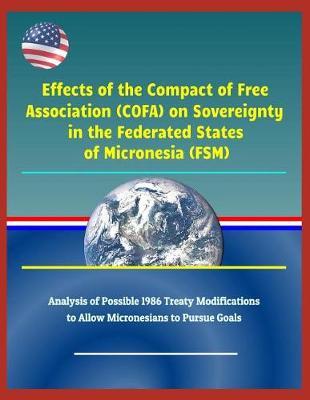Overview
The Compact of Free Association (COFA), a 1986 treaty between the United States and the Federated States of Micronesia (FSM), formalizes a specific type of shared sovereignty: free association between politically independent nations. The COFA intentionally compromises some aspects of Micronesian sovereignty by ceding limited authority to the United States, backed by the FSM's international legal standing. In return, the FSM should gain the political and economic capacity to be more effectively sovereign than it could be without external assistance. Whether free association remains the best avenue for the FSM to pursue its national goals depends on how sovereign authority is maintained. Does the COFA undermine the FSM's political authority in order to support U.S. strategic interests, or does it properly leverage the FSM's international legal standing and greater U.S. capacity in support of mutual interests? A critical look at international legal norms and shared sovereignty regimes, followed by a qualitative cost-benefit analysis with respect to sovereignty, might best answer that question. The results suggest necessary modifications to the U.S.-FSM COFA, as well as a revised understanding of free association and its potential effects on sovereignty. Chapter I, the introduction, explains the current U.S.-FSM relationship under the Compact of Free Association, and provides the research question and its significance. Chapter II provides historical perspectives on the Trust Territory and decolonization efforts, summarizes the concept of sovereignty, and explores the implications of free association as an internationally recognized status. This chapter examines shared governance agreements and provides an assessment of common misunderstandings concerning free association, with the aim of establishing the FSM as a sovereign, independent state in practice as well as in theory. Chapter III examines the U.S.-FSM COFA relationship in terms of modern requirements for viable statehood, as opposed to the original exigencies of post-Cold War power politics. In particular, the research identifies the internal demands of the island economy as well as the external demands of the international economy-including participation in the UN system-that the FSM is currently unable to meet on its own. Chapter IV consists of a qualitative cost-benefit analysis of COFA provisions with regard to the different dimensions of sovereignty. Chapter V identifies structural changes to the COFA that could better preserve FSM sovereignty and economic interests alongside U.S. involvement in the region. Chapter VI concludes with a revised understanding of free association, based on the results of this research, as a model for preservation of sovereignty by small states wishing to join a political symbiosis.
Full Product Details
Author: U S Military ,
Department of Defense (Dod) ,
Ian Rummel
Publisher: Independently Published
Imprint: Independently Published
Dimensions:
Width: 21.60cm
, Height: 0.50cm
, Length: 28.00cm
Weight: 0.245kg
ISBN: 9781718082267
ISBN 10: 1718082266
Pages: 96
Publication Date: 08 August 2018
Audience:
General/trade
,
General
Format: Paperback
Publisher's Status: Active
Availability: Available To Order

We have confirmation that this item is in stock with the supplier. It will be ordered in for you and dispatched immediately.




